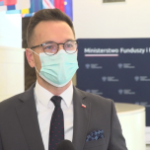Data publikacji: 2020-07-30, 15:52
Oryginalny tytuł wiadomości prasowej: Office space sector in Poland in the face of coronavirus — expert debate
Kategoria: BIZNES, Nieruchomości,
The coronavirus pandemic has significantly influenced the preferences of office tenants, and the interest in flexible spaces in Poland does not slow down, it can even accelerate. This is just one of the takeaways on the future of offices from the debate entitled “Impacts of coronavirus on the office space market in Poland: The broker’s angle.”
The coronavirus pandemic has significantly influenced the preferences of office tenants, and the interest in flexible spaces in Poland does not slow down, it can even accelerate. This is just one of the takeaways on the future of offices from the debate entitled “Impacts of coronavirus on the office space market in Poland: The broker’s angle.” The event hosted by Mindspace, a global operator of boutique flexible workspaces, included representatives of advisory agencies such as JLL, CBRE, Colliers International, and Cushman & Wakefield.
As Yotam Alroy, Co-founder and CBO of Mindspace, said at the beginning of the debate, “The COVID-19 pandemic has caused significant changes in both our lives and work environment. As a result of the coronavirus, most of us started working remotely. Therefore, a number of real property players—advisory agencies, owners, operators and office managers—have been asking themselves questions about the future of offices for several months now. Our observations show that during the pandemic, many companies began to treat flexible office space as an alternative to a traditional office. This is evidenced, among other things, by the growing interest among potential clients in spaces offered by Mindspace. This trend is also visible at our Warsaw branch, which strengthens my belief that the demand for flexible office space will continue to grow in Poland. We are forecasting a marked shift from the traditional lease model to flexible partnership-based agreements between operators and building owners. We also expect a major consolidation in the industry, i.e. a number of mergers and acquisitions. In our opinion, this will happen over the next 12 to 24 months.”
During the meeting, all speakers agreed that office tenants’ preferences were subject to change due to coronavirus. The experts’ observations show that numerous companies have already made or are considering a decision as regards moving some of their branch offices or even head offices to flexible space with a view to optimizing their expenditures and the possibility of reducing or increasing the leased space at any time, without the need for long-term commitments.
Adam Lis, Flexible Office Solutions Manager at JLL, commented: “Undoubtedly, in these times of pandemic, the flexibility of lease agreements has gained increasing importance, also for the SME sector and corporate clients. In these rather unpredictable times, short-term agreements, often with one month’s notice, have proved to be an ideal solution and can represent a lifeline for many companies. This illustrates the value of flexibility for tenants, both small and large, and strengthens the position of flexible solutions in the commercial real estate property market.”
Adam Lis continued: “Landlords on the ‘traditional’ office market have been learning from flexible space operators about how to take care of their tenants and how to meet their ever-growing needs. Flexible space is a sign that the landlords’ perspective is changing from tenant-centric to human-centric. All of us, especially office workers, could benefit from this change.”
Konrad Szaruga, Head of Flexible Workplace at CBRE, remarked: “COVID-19 has left its mark on all segments of the real property market. As far as its impact on the market of flexible office space is concerned, we can see the strengthening of the current trend that it is an excellent solution for new companies, especially for foreign entities—taking into account a time horizon spanning from several months to two years. Secondly, we observe that flexible spaces are gaining ground among companies seeking both permanent headquarters and a temporary office to meet short-term needs. Here, we see very clear interest of companies that are unwilling or unable to work from home, but at the same time are currently unwilling to make long-term decisions due to the unstable market situation.”
In turn, according to Mikołaj Niemczycki, Capital Markets Associate at global real estate services firm Cushman & Wakefield, the growing interest of office tenants in flexible space is mainly due to the changing expectations of their employees. As Niemczycki explained, “The pandemic has proven that home office is a solution that works not only temporarily. However, the natural challenges of working from home make you want to return to the office. What is more, the expectations of employees have changed, and today they expect greater freedom of choice in the place and form of work. In the coming years, the winners will be those employers who provide adequate infrastructure for employees who prefer to work from home or decide to open satellite offices, on the outskirts of cities or in residential areas. It is in these locations, offered on flexible lease terms, that we see the greatest potential for further development of the flexible office segment. Flexible offices can fill an important gap, responding to the new needs of employees.”
Renata Hartle, manager of Flex Office Strategy & Technology Solutions at Colliers International, stressed during the meeting that the coronavirus had significantly influenced not only employees’ expectations for their work environment, but also the daily operation of office facilities: “The COVID-19 pandemic definitely accelerated the implementation of technology-based solutions on the real property market. Desk reservation systems and occupancy rate analysis had been seen as a gadget in recent years. Today, however, they are becoming the most sought-after solutions to support returns to offices. At the top of the popularity list there are also technologies supporting contactless moving around within the space and flexible car park management.”
Michał Kwinta, Senior Community Manager at Mindspace Koszyki, said: “In fact, the coronavirus has significantly impacted workplaces. Although our strategy has not changed—we are still putting an emphasis on commercialization—today we have an additional task. We have to ensure Mindspace users a completely safe place. In the past months, we have done a lot of work at Mindspace Koszyki to adapt its space as quickly as possible to the new reality. Our priority has been to provide a healthy and professional workspace to our members and their guests. Today, I can truly confirm that flexibility is what we are best at.”
Mindspace, a global operator of boutique and flexible office spaces for companies of all sizes, currently present in 31 locations in Europe, the United States and Israel, was the organizer of the debate entitled “Impacts of coronavirus on the office space market in Poland: The broker’s angle.”
źródło: Biuro Prasowe
Załączniki:







![osteoporoza-foto2wo_270ho_152_small W wyniku pandemii tysiące chorych na osteoporozę pozostają bez pomocy. Lekarze i pacjenci apelują o proste zmiany umożliwiające diagnostykę i leczenie [DEPESZA]](https://www.anetta.pl/om/wp-content/uploads/2020/11/osteoporoza-foto2wo_270ho_152_small-150x150.jpg)
